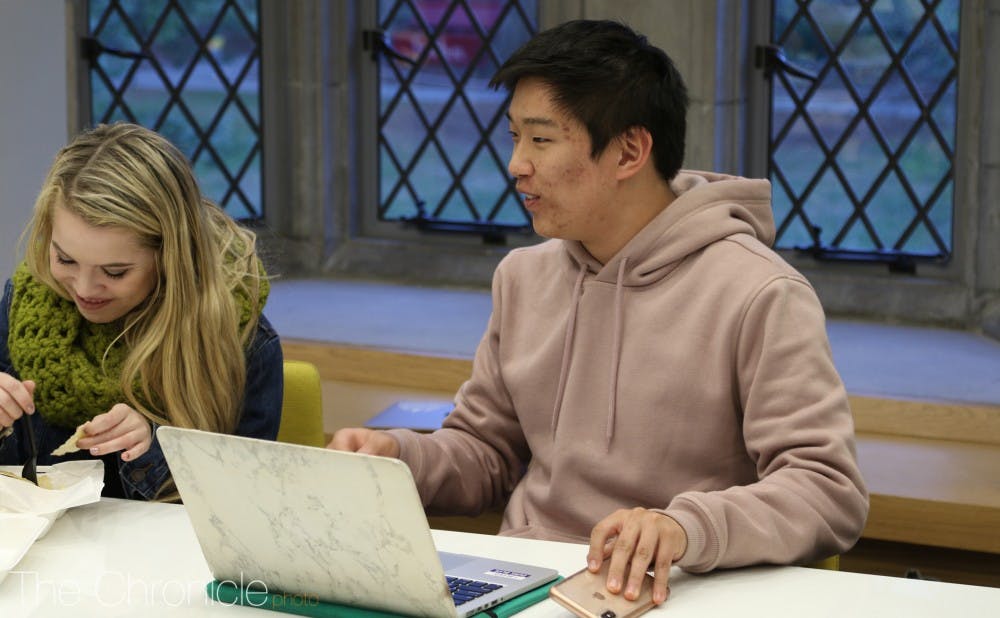Ever wonder what happened to food trucks that once lined the loop in front of the Chapel?
At its Thursday meeting, the Duke University Student Dining Advisory Committee deliberated on how the popularity of food trucks has declined since the construction of the Brodhead Center. There are six food trucks currently in operation for two evening shifts, one from 5 p.m. to 7 p.m. on Swift Avenue and one from 8 p.m. to 10 p.m. near the Wellness Center.
“Ultimately, we want to support the brick-and-mortar venues on campus because they are here every day, all day, in and out, paying the Duke wage, using our sustainability practices, and making sure our Duke students are fed seven days a week,” said Aris Marton, assistant director of retail operations for Duke Dining services. “We also want to support food trucks as best we can.”
Marton explained how she views two sides to the food truck predicament. On the one hand, once students gained so many more options, there was a “loss of sales” for food trucks because they are in less visible locations than in front of the Duke Chapel.
On the other hand, there have been issues regarding food trucks being present for the full duration of their shifts, though “students are expecting a food truck,” Marton said.
Marton said that Duke Dining has since talked with them about staying for the entire shift.
Although the food truck shifts started last year, the Wellness Center parking lot was under construction during the fall semester, and the cold outdoor temperatures were not good for business. There have also been issues with the WiFi at the Swift locations.
Marton noted that the sales at the Swift food trucks are lower than last year. After a discussion amongst committee members on the reason for the change, she noted that it could be Thrive's presence on Central Campus.
“Swift’s sales are better than Wellness, but they’re down from last year,” Marton said.
Senior DUSDAC members applied their memories of food trucks before the Brodhead Center to the current situation surrounding food trucks.
To senior Caroline Bay, the biggest problem for food trucks is location. She said that when she mentions food trucks to her friends, many do not even know that there are food trucks still on campus.
She suggested that Duke Dining have more Facebook posts related to food trucks.
“I think we really need to analyze the future of food trucks,” Bay said. “The future is not looking bright—kind of bleak.”
Senior Anna-Karin Hess said that most students who want to eat “late night food” typically go to Café Edens. She also pointed to how there is a food truck behind the Hollows for construction workers and asked whether a food truck could be placed there.
Marton explained that the food truck was “worked out for the fact that the construction is there.” Moreover, the food truck is not there all day, Marton said.
“I feel like the future at Wellness is not sustainable,” Kwok said. “Once our class leaves, I feel like there won’t be anyone familiar [with food trucks]. It’s like an urban legend, like a myth.”
In other business
Marton conducted a “small fruit container experiment” with fruit from Red Mango. She attempted to create various fruit combinations to see if the container would weigh over $5, but said she never exceeded the limit.
DUSDAC’s vendor liaison program is in full swing. First-year Alix Rosenberg met with a Red Mango liaison today and said that Red Mango is “very supportive of the program.”
Samantha Glover, Trinity '18, also discussed the possibility of create-your-own-smoothies at Red Mango. Instead of inputting the ingredients at the front register–which might take too long and would require printing it out–she proposed creating a laminated form for customers to select a base, a fixed number of fruits, and additional fruits at extra charge. Customers would hand in the form to the workers behind the counter.
Get The Chronicle straight to your inbox
Sign up for our weekly newsletter. Cancel at any time.

Stefanie Pousoulides is The Chronicle's Investigations Editor. A senior from Akron, Ohio, Stefanie is double majoring in political science and international comparative studies and serves as a Senior Editor of The Muse Magazine, Duke's feminist magazine. She is also a former co-Editor-in-Chief of The Muse Magazine and a former reporting intern at PolitiFact in Washington, D.C.

